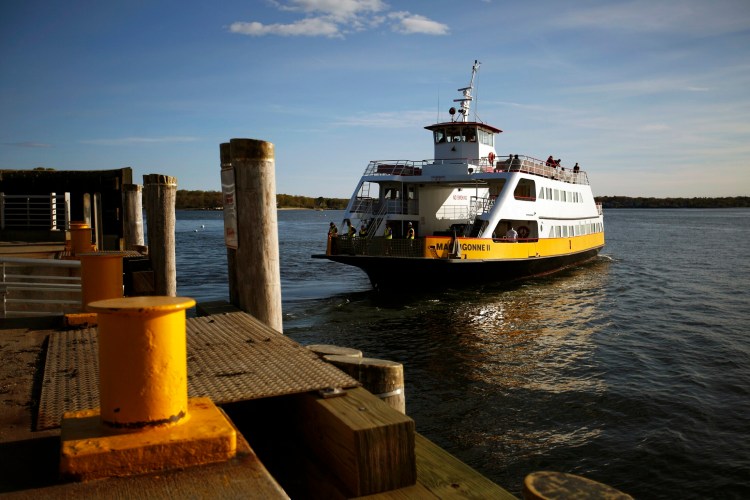The Casco Bay Lines board of directors voted 9-2 Thursday to move forward with controversial plans for a new ferry that could carry an additional 200 passengers to Peaks Island.
Island residents have repeatedly expressed concerns that the larger ferry would only increase the amount of tourist traffic, adding to existing public safety and quality-of-life issues that come with the growing summertime crowds of day-trippers, wedding parties and those drawn by weekly reggae concerts and other events.
In an attempt to address some of those concerns, the board also voted to limit passenger capacity for the new ferry to 499 passengers on outbound trips to Peaks. The vessel would carry the full load of as many as 599 people back to Portland – a move aimed at easing congestion by getting people off the island more efficiently.
After the meeting, several islanders said they were disappointed with the decision.
Jean Hoffman had questioned the assumptions behind a financial analysis used to support the larger ferry. Like others, she believes that the decision to build a bigger ferry was a foregone conclusion, since the naval architects were only asked to design the largest possible ferry.
“I’m disappointed, but I’m not surprised,” Hoffman said. “It doesn’t appear that any analysis was ever done on a smaller boat.”
Board member Robin Clark said prior to Thursday’s vote that a larger ferry will continue to keep the island and the transit service viable into the future. It also would address safety issues that come with the crowding of cars on the ferry, she said. The new ferry will be able to carry three additional vehicles.
“Right now it’s a dangerous situation – you couldn’t get out of your car if you wanted to if the vessel was going down,” said Clark, who owns the Harborview at Jones Landing, which hosts the popular Reggae Sundays. “It’s time to get going on this boat.”
But fellow board member David Crowley of Cliff Island disagreed and voted against the larger ferry.
“In my heart of hearts, I don’t think we’re going to be able to afford the larger vessel in 30 years,” he said.
The board originally planned to vote on the ferry in March, but postponed the vote for 60 days to research concerns raised by islanders during a public hearing.
As a result of that effort, ferry staff will develop a recommendation to the board about whether a new vehicle reservation system should be adopted to handle congestion at both the mainland terminal at the Maine State Pier and the island terminal.
Jonathan Greven, Casco Bay Lines’ director of finance and human resources, said that over the last 14 years passenger volumes have actually declined in the offseason during December, January, February and March. But growth in the other months, particularly between August through October, has carried the ferry service.
Greven said that 60 percent of the full capacity trips are return trips from Peaks to Portland. Greven also said that vehicle and freight traffic has been steadily growing, with the biggest increases during the offseason months.
Meanwhile, the city said Wednesday that it is committed to studying and addressing congestion and safety issues at both the island and mainland terminals.
But in the end, residents continued to have concerns with the possible impacts of a larger ferry. Some believe the primary motivation for the larger ferry was to increase revenue during the busy summer months, rather than serving the best interest of island residents.
“I see this ferry as being profit-driven and willing to sacrifice island life for that profit,” Lisa Penalver said. “I’m concerned this could turn Peaks Island into a theme park and that’s not what we are. We’re just a small residential community.”
Some warned that overcrowding on the island, coupled with a lack of amenities such as public restrooms and a lack of activities on, could cause tourists to stop coming, thereby jeopardizing the financial sustainability of the larger ferry.
“It’s not a paranoid fantasy on my part – there have been communities that have been destroyed by overtourism, and increased vessel capacity will promote overtoursim,” Andrea Rosenberg said.
The new ferry would replace the 399-passenger Machigonne II, which was put into service in 1987. The new ferry is expected to cost about $10 million, with 85 percent of those costs being covered by federal funding, including a $6 million grant announced last year. Casco Bay Lines hopes to have it in service in 2021.
Casco Bay Lines General Manager Hank Berg said the design process is only 20 percent complete and that the public will continue to have input throughout the process.
“We appreciate all those members of the public who have participated in this process, both in support of higher capacity and in opposition,” Berg said in a written statement after the meeting. “It’s a powerful demonstration of what makes (the Casco Bay Island Transit District) and the island communities so unique and we hope this dialogue will continue throughout the significant portion of work remaining for this project as we progress beyond the initial stages of design.”
Send questions/comments to the editors.


